|
AMERICAN
GO E-JOURNAL |
Non-members: join the American Go Association and get all this great content every week. It's all just a click away! |
August
7, 2008; Volume 9, #40 Special U.S. Go Congress Edition
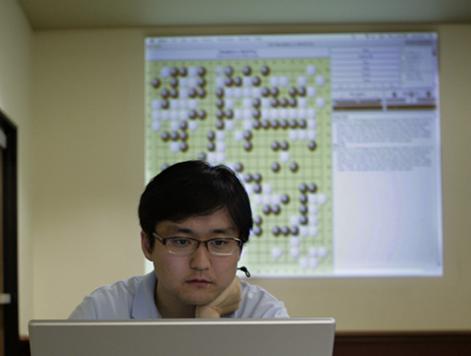 Myungwan
Kim 8P (l) Thursday afternoon by 1.5 points in a 9-stone game billed as
“Humanity’s Last Stand?” “It played really well,” said Kim, who
estimated MoGo’s current strength at “two or maybe three dan,” though
he noted that the program – which used 800 processors, at 4.7 Ghz, 15
Teraflops on a borrowed European supercomputer – “made some 5-dan
moves,” like those in the lower right-hand corner, where Moyogo took
advantage of a mistake by Kim to get an early lead. “I can’t tell you
how amazing this is,” David Doshay -- the SlugGo programmer who
suggested the match -- told the E-Journal after
the game. “I’m shocked at the result. I really didn’t expect the
computer to win in a one-hour game.” Kim easily won two blitz games
with 9 stones and 11 stones and minutes and lost one with 12 stones and
15 minutes by 3.5 points. The games were played live at the U.S. Go
Congress, with over 500 watching online on KGS. “I think there’s no
chance on nine stones,” Kim told the EJ after the game. “It would even
be difficult with eight stones. MoGo played really well; after getting
a lead, every time I played aggressively, it just played safely, even
when it meant sacrificing some stones. It didn’t try to maximize the
win and just played the most sure way to win. It’s like a machine.” The
game generated a lot of interest and discussion about the game’s
tactics and philosophical implications. “Congratulations
on making history today,” g
Myungwan
Kim 8P (l) Thursday afternoon by 1.5 points in a 9-stone game billed as
“Humanity’s Last Stand?” “It played really well,” said Kim, who
estimated MoGo’s current strength at “two or maybe three dan,” though
he noted that the program – which used 800 processors, at 4.7 Ghz, 15
Teraflops on a borrowed European supercomputer – “made some 5-dan
moves,” like those in the lower right-hand corner, where Moyogo took
advantage of a mistake by Kim to get an early lead. “I can’t tell you
how amazing this is,” David Doshay -- the SlugGo programmer who
suggested the match -- told the E-Journal after
the game. “I’m shocked at the result. I really didn’t expect the
computer to win in a one-hour game.” Kim easily won two blitz games
with 9 stones and 11 stones and minutes and lost one with 12 stones and
15 minutes by 3.5 points. The games were played live at the U.S. Go
Congress, with over 500 watching online on KGS. “I think there’s no
chance on nine stones,” Kim told the EJ after the game. “It would even
be difficult with eight stones. MoGo played really well; after getting
a lead, every time I played aggressively, it just played safely, even
when it meant sacrificing some stones. It didn’t try to maximize the
win and just played the most sure way to win. It’s like a machine.” The
game generated a lot of interest and discussion about the game’s
tactics and philosophical implications. “Congratulations
on making history today,” g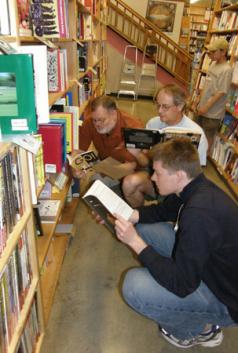 ame
organizer Peter Drake told both Kim and Olivier Teytaud, one of MoGo’s
programmers, who participated in a brief
online chat after the game. At a rare loss for words in a brief
interview with the EJ after the game, Doshay wondered “How much time do
we have left? We’ve improved nine stones in just a year and I suspect
the next nine will fall quickly now.”
ame
organizer Peter Drake told both Kim and Olivier Teytaud, one of MoGo’s
programmers, who participated in a brief
online chat after the game. At a rare loss for words in a brief
interview with the EJ after the game, Doshay wondered “How much time do
we have left? We’ve improved nine stones in just a year and I suspect
the next nine will fall quickly now.”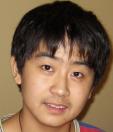 this
year’s Redmond cup at the US Go Congress. He defeated Cherry Shen 6d in
Round 1 on Sunday night, and won against William Zhou 7d in Round 2 on
Monday. Shi represented Canada at the World Youth Go Championships last
month, and will be attending high school in Toronto this coming fall.
Shi began playing go in China at the age of six. “Making friends while
learning to play go has increased my interest in the game,” Shi told
the E-Journal. “Mentality is very important for improvement; someone
who wants to defeat strong opponents all of the time will improve
rapidly,” he added. Shi appears to be getting his wish, with serious
competition in the Redmond from Shen and Zhou. Fifteen-year-old Shen
was second place in the Redmond Cup last year, and appeared poised for
victory this year, but lost to Zhou in round 3 on Tuesday. With Shen
knocked out, the finals will end up a best 2 out of 3 between Zhou and
Shi. Zhou has compiled a perfect record in national youth tournaments
over the past two years, racking up an impressive 15-0 record between
the USYGC, the Redmond Cup, and the Youth All Stars Tournament at the
Go Congress. Zhou’s winning streak came to an end in the 5th round of
the Redmond Cup, where he lost to Shi; both boys are competing in the
Redmond for the first time. The Canadian and US youth champions have
not met in a Redmond final since 2006. Round 4 will be broadcast live
in the English Game Room on KGS at 7 pm on Thursday. If Zhou loses, he
will be second place, but if he wins he will play a tie-breaker with
Shi on Friday night.
this
year’s Redmond cup at the US Go Congress. He defeated Cherry Shen 6d in
Round 1 on Sunday night, and won against William Zhou 7d in Round 2 on
Monday. Shi represented Canada at the World Youth Go Championships last
month, and will be attending high school in Toronto this coming fall.
Shi began playing go in China at the age of six. “Making friends while
learning to play go has increased my interest in the game,” Shi told
the E-Journal. “Mentality is very important for improvement; someone
who wants to defeat strong opponents all of the time will improve
rapidly,” he added. Shi appears to be getting his wish, with serious
competition in the Redmond from Shen and Zhou. Fifteen-year-old Shen
was second place in the Redmond Cup last year, and appeared poised for
victory this year, but lost to Zhou in round 3 on Tuesday. With Shen
knocked out, the finals will end up a best 2 out of 3 between Zhou and
Shi. Zhou has compiled a perfect record in national youth tournaments
over the past two years, racking up an impressive 15-0 record between
the USYGC, the Redmond Cup, and the Youth All Stars Tournament at the
Go Congress. Zhou’s winning streak came to an end in the 5th round of
the Redmond Cup, where he lost to Shi; both boys are competing in the
Redmond for the first time. The Canadian and US youth champions have
not met in a Redmond final since 2006. Round 4 will be broadcast live
in the English Game Room on KGS at 7 pm on Thursday. If Zhou loses, he
will be second place, but if he wins he will play a tie-breaker with
Shi on Friday night.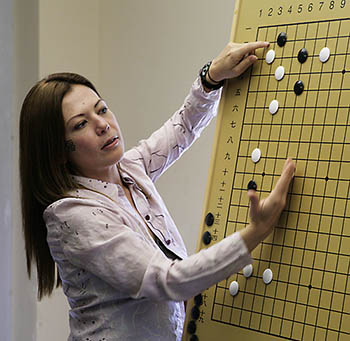 Paul Barchilon
Paul Barchilon ning is.
So I asked T Mark Hall, one of the authors of the invaluable GoGod
database, who’s here at the U.S. Go Congress this week, and we
discovered that the low Chinese opening first appears in a June 1951
game, where Guo Tisheng played it as White against Chen Yi, both
Chinese pros. The earliest game we found with Black using the low
Chinese is in November 1963 when Chen Zude (l) used it, a top Chinese
pro, used it against Miyamoto Naoki. The opening became famous when
Chen Zude used it to defeat several Japanese pros in one of the
China-Japan matches. The high Chinese opening first appears in the
Meijin League in 1971 in Japan when Otake Hideo uses it playing Black
against Sugiuchi Masao and wins. T Mark Hall also reports an
unauthenticated rumor that the low Chinese opening was invented by a
Japanese amateur who showed it to a Chinese pro on a visit there.
Perhaps we should really call it the Chen Zude opening since he was the
first to make a big impact with it.
ning is.
So I asked T Mark Hall, one of the authors of the invaluable GoGod
database, who’s here at the U.S. Go Congress this week, and we
discovered that the low Chinese opening first appears in a June 1951
game, where Guo Tisheng played it as White against Chen Yi, both
Chinese pros. The earliest game we found with Black using the low
Chinese is in November 1963 when Chen Zude (l) used it, a top Chinese
pro, used it against Miyamoto Naoki. The opening became famous when
Chen Zude used it to defeat several Japanese pros in one of the
China-Japan matches. The high Chinese opening first appears in the
Meijin League in 1971 in Japan when Otake Hideo uses it playing Black
against Sugiuchi Masao and wins. T Mark Hall also reports an
unauthenticated rumor that the low Chinese opening was invented by a
Japanese amateur who showed it to a Chinese pro on a visit there.
Perhaps we should really call it the Chen Zude opening since he was the
first to make a big impact with it.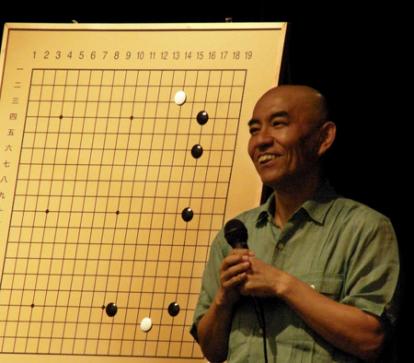 broadly
at the overflow audience in the U.S. Go Congress main playing room.
“When you sit down to play a game is your aim to win the game or to
become stronger? You probably think you can do both,” he continued,
“but these are quite different projects.” A nervous chuckle ran through
the audience. “The problem with trying to win – besides the fact that
it makes it hard to enjoy the game – is that you don’t trust your
feelings about where to play. When you look over the board there’ll be
a place find you want to play, but if you’re concerned about winning,
you’re not going to trust your feeling. You’ll think and analyze and
nervously play somewhere else. This is a terrible way to play go. You
should look at the board and play wherever you want to. This is the way
to get stronger. I say this everywhere I go, around the world, but no
one believes me. Nevertheless it’s true. Of course, when you do this,
you’ll lose a lot of games. So you have to review the games. That way
your feelings about the game will get better and you will not only get
stronger, you’ll also find that playing go is a lot of fun. And you’ll
win more often. This is go the natural way.” Another surprising
suggestion from Takemiya is “Don’t worry about territory. People say
that the player with the most territory wins but this is not true. It’s
the player with the most territory at the end who wins. The way to win
is not to worry about how much territory each player gains. The key is
making good shape. If you learn how to make good shape all over the
board, you’ll be the one who wins.”
broadly
at the overflow audience in the U.S. Go Congress main playing room.
“When you sit down to play a game is your aim to win the game or to
become stronger? You probably think you can do both,” he continued,
“but these are quite different projects.” A nervous chuckle ran through
the audience. “The problem with trying to win – besides the fact that
it makes it hard to enjoy the game – is that you don’t trust your
feelings about where to play. When you look over the board there’ll be
a place find you want to play, but if you’re concerned about winning,
you’re not going to trust your feeling. You’ll think and analyze and
nervously play somewhere else. This is a terrible way to play go. You
should look at the board and play wherever you want to. This is the way
to get stronger. I say this everywhere I go, around the world, but no
one believes me. Nevertheless it’s true. Of course, when you do this,
you’ll lose a lot of games. So you have to review the games. That way
your feelings about the game will get better and you will not only get
stronger, you’ll also find that playing go is a lot of fun. And you’ll
win more often. This is go the natural way.” Another surprising
suggestion from Takemiya is “Don’t worry about territory. People say
that the player with the most territory wins but this is not true. It’s
the player with the most territory at the end who wins. The way to win
is not to worry about how much territory each player gains. The key is
making good shape. If you learn how to make good shape all over the
board, you’ll be the one who wins.” 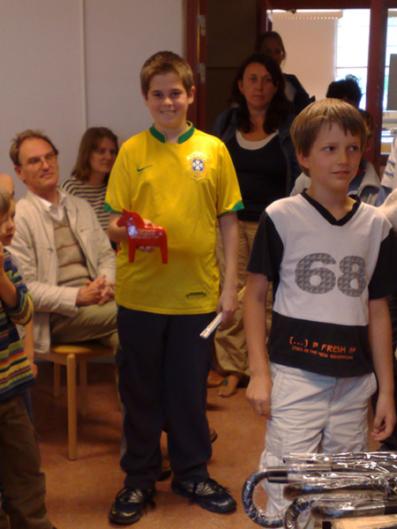 two
more games to go, Park is followed by eight players with one less win,
most of whom he has already defeated. The outcome of the title for the
best native European is more unclear and, like last year, will be
probably decided by tiebreak as several players will likely have the
same number of wins. For the time being Catalin 5P has the best SOS.
The main tournament now has 707 participants, just five short of the
2005 Prague EGC record. Quote of the day: "Last week my son didn't know
how to play yet,” said Michael Riegler. ”So I taught him on 9x9. Right
now he's at 5-1 on 13x13." Said TD Tonny Claasen --whose son also won a
prize --”These children progress very fast."
two
more games to go, Park is followed by eight players with one less win,
most of whom he has already defeated. The outcome of the title for the
best native European is more unclear and, like last year, will be
probably decided by tiebreak as several players will likely have the
same number of wins. For the time being Catalin 5P has the best SOS.
The main tournament now has 707 participants, just five short of the
2005 Prague EGC record. Quote of the day: "Last week my son didn't know
how to play yet,” said Michael Riegler. ”So I taught him on 9x9. Right
now he's at 5-1 on 13x13." Said TD Tonny Claasen --whose son also won a
prize --”These children progress very fast."